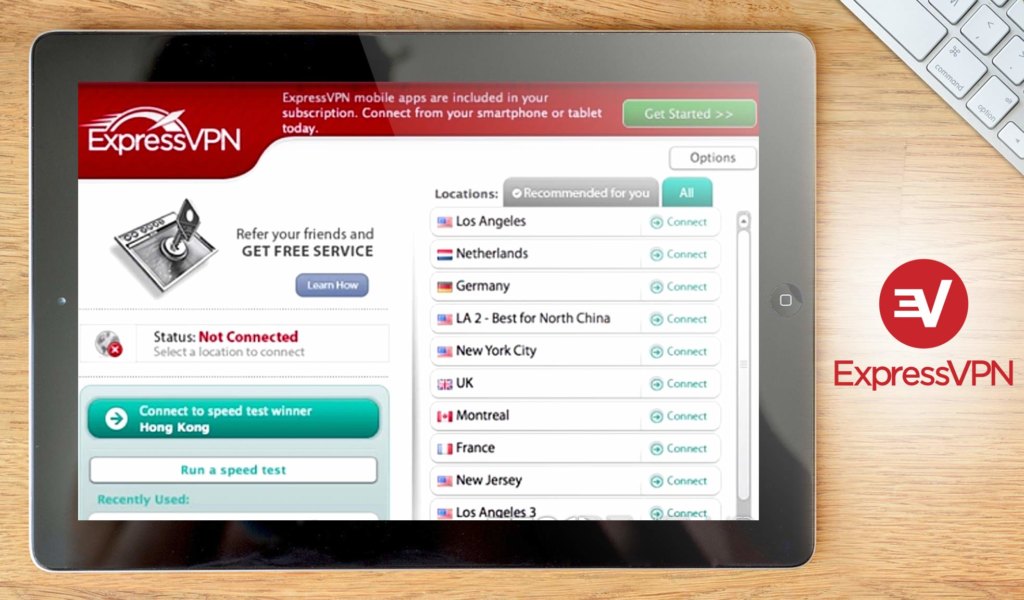In China, the government maintains strict control over the internet. Many popular websites and apps are blocked, and online content is heavily censored. As a result, many people use virtual private networks or VPN services to bypass the government’s restrictions. VPNs allow users to disguise their location and access blocked websites.
In addition, VPNs encrypt internet traffic, making it more difficult for the government to track online activity. VPNs are an essential tool for anyone who wants to stay connected in China.
While a free VPN for China may be available, it is unreliable and can be dangerous to use. For best results, we have listed the best China VPN service in this article, accounting for their fast speeds and strong security. By choosing from this list, you’ll have a higher chance of using a VPN service that works in China.

Best China VPN Table of Contents
China’s censorship of foreign media is well-known, but the extent to which it occurs may surprise many people. The Chinese government has a strict system of controls in place that limits what news stories can be reported on and where they can be reported. In addition, the government often blocks access to certain news websites, such as the BBC and CNN, from within China.
According to the advocacy group Freedom House, China scores 10/100 in internet freedom, with 100 being “most free.” In detail, the group reported that more mobile apps were blocked between June 2020 and May 2021 and that an ongoing crackdown on VPNs has intensified within the said period. The government controls all gateways to global internet, hence access to Western websites and apps is highly regulated, if not banned. This strict oversight of web activities is also a reason to get mobile browser security.
Source: Statista, 2022
Sadly, these rigid internet restrictions are creating a next-generation of Chinese nationalists fed with hate of democratic media. With 989 million internet users in the country (as of December 2020), China’s lack of internet freedom is a global concern.
What are the legal risks of using a VPN in China?
Using a VPN in China can be risky due to the country’s strict laws regulating internet usage. While VPNs are essential tools for bypassing the “Great Firewall” and accessing restricted content, their use is heavily restricted by the Chinese government. Here are some key legal risks to be aware of when using a VPN in China:
- Government Crackdowns on Unapproved VPNs: China has implemented stringent measures to block unauthorized VPN services. Only government-approved VPNs are legal, and these are primarily used by businesses with specific permits. Using an unapproved VPN is considered illegal, and authorities actively monitor and block VPN traffic.
- Fines and Penalties for Individuals: While the government is more focused on cracking down on businesses using unauthorized VPNs, individuals caught using illegal VPNs can face fines or have their internet services suspended. Individuals may also face more serious legal consequences in some cases, especially if involved in politically sensitive activities.
- Surveillance and Monitoring: The Chinese government monitors internet traffic closely, and VPN traffic is often a red flag. While VPNs offer encryption and privacy, they are not foolproof. Authorities can detect VPN use through deep packet inspection, and users may be subject to surveillance.
- Potential for VPN Service Shutdowns: VPN providers regularly face challenges operating in China. Many popular VPN services are often blocked or disrupted, meaning even legal VPNs may stop working without warning, leaving users without access to restricted websites.
- Risk to Businesses and Foreign Nationals: Foreign businesses and individuals in China may face significant legal risk if caught using or providing unauthorized VPN services. Companies that rely on VPNs for secure communication might have to pay hefty fines if they fail to comply with Chinese laws.
Concerningly, VPN to China is seen as an affront to state security. It’s an uphill task for VPN services in China. But so far, these providers on our list have managed to connect foreigners living in the country to the world outside.
15 Best China VPN in 2026
1. Bright Data

Bright Data is arguably the best VPN for China for the sheer number of its China IPs—over 1.25 million of them. The provider has four proxy networks in the country for residential, mobile, ISP and datacenters. With several options to bypass location-based blockades or cloaking, you also get an uninterrupted connection. This is handy especially during peak internet traffic.
The provider claims 99.99% network uptime, one of the highest in the industry. For additional speed and privacy, Bright Data has dedicated proxies that you can use exclusively. It has global coverage and are GDPR and CCPA compliant.
You also get to use a Proxy Manger to gain full control of IP rotations. The feature lets you see detailed request logs and statistics by port, as well, the better to determine proxy access permission, improve connectivity performance and reduce proxy traffic.
Expectedly, the VPN’s advanced features make Bright Data pricing one of the more costly on the market. This may not be a fit if you’re in for an affordable, temporary VPN. Compared to standard VPN services, Bright Data plans are geared towards an enterprise budget.
Detailed Bright Data Review
2. NordVPN

NordVPN can get through Chinese VPN restrictions. But know that this is not always the case because the Chinese government can decide one day to just ban a VPN service. But with its 5,500 servers across 59 countries, NordVPN gives you a high chance of surfing banned Western websites in China from several nearest servers for optimal speed.
Critically, as the Chinese government has a reputation to shut off servers as it pleases, you may find your internet access blocked one day. You can jump servers to regain connection.
Detailed NordVPN Review
Using NordVPN in China is the same as elsewhere: download the app and connect to the nearest server. However, some regions in China will have stricter firewalls, so you may need to enable the VPN’s advanced security features.
For instance, the Threat Protection blocks malware and disruptive ads, while the Kill Switch disconnects your internet access if you lose VPN connection. This will stop spying eyes from connecting to your computer during downtime.
You can also set the app to the VPN protocol NordLynx to improve connectivity.
3. ExpressVPN

ExpressVPN is one of the lucky services to still work in China. You can still select from among its 3,000+ servers in 94 countries to access geo-restricted websites.
Notably, it doesn’t have a China VPN server, so the provider doesn’t have to comply with Chinese data-retention laws. And government agents cannot bug its hardware simply because ExpressVPN has none in the country.
Detailed ExpressVPN Review
However, there are steps to be taken to make sure this VPN works when you arrive in China. First, make sure it’s already installed before you get into China. The ExpressVPN website is blocked in that country. Second, you should enable automatic connect when you turn on your device. Third, enable kill switch to disconnect your internet connection if the VPN drops. In all these cases, you want to prevent a window of local connection, enough time for government agents to pry into your browsing and device details.
4. Perimeter 81

While the Perimeter 81 implies its VPN helps you access blocked websites in restricted countries like China, there is no guarantee it will work always. The reason is often beyond the VPN service, as local regulations can change without warning.
Still, if you’re only paying the country a short visit, it’s worth a shot to go for Perimeter 81. This makes sense if you’re already a subscriber. If you can afford it, having a VPN alternative, ideally any of the three services above, is also good practice.
Detailed Perimeter 81 Review
Perimeter 81 has solid features such as unified management, 360-degree visibility and instant deployment. You also get lightning-fast connection and zero-trust access, tools that can circumvent geo-restrictions.
The VPN service is designed towards enterprise security, making it ideal for IT management, DevOps and CISOs.
5. Cisco AnyConnect

Cisco AnyConnect works in China. That’s good news for companies reliant on its enterprise security architecture, including cloud and application security, network security and user and device security.
Its VPN is one of the most robust services around, to a point that it can be a tad technical for casual users. Cisco AnyConnect allows you to use captive portal hotspot detection and remediation. It also lets you configure it over PPTP or L2TP and use proxy connections.
Detailed Cisco AnyConnect Review
Likewise, you can set VPN connections to specific server locations to identify names and addresses that will access the secure gateways.
You can also start the VPN automatically on system boot, blocking any chance of anyone spying into your device at anytime you’re using it.
6. hide.me

hide.me is one of the most reliable VPN services around. This is why you’ll be glad to know that the provider is downright honest when it says it cannot guarantee its service in China will work 100% all the time. Again, this is because of the country’s national and local governments’ unpredictable take on select VPN services.
The good news is, many have used hide.me in China with a bit of setting adjustment. First, make sure you’re client app is the latest version. You can also change DNS servers in case the local IP service provider blocks the one you’re currently using.
Detailed Hide.me Review
Likewise, changing VPN connection protocols should help you bypass geo-location restrictions. You can follow the steps here. In general, you disable the Fallback Protocol, change to SSTP and connect via IKEv2 or OpenVPN-TCP or OpenVPN-UDP. A bit of trial-and-error is needed though, as no one specific step guarantees reconnection.
7. CyberGhost

CyberGhost works in China but only if you download the app prior to arriving in the country. With VPN restrictions in China getting tighter by the day, most VPN apps, including CyberGhost, are inaccessible online.
To make CyberGhost work in China, the provider recommends you configure your connection to L2TP. The VPN service has over 9,200 servers globally, 12 of which are in China. This extensive network means you’re less confined to a specific location. You can server-hop to bypass restrictions.
Detailed CyberGhost Review
The provider claims to use the “toughest encryption technology” to hide your IP from spying eyes. Along with the standard no-logs policy, your online activities should be difficult to crack using the VPN.
8. Private Internet Access

Private Internet Access is a reliable VPN worldwide. But, in China, things don’t usually work out as expected. Some attest that they have used the VPN service in the country without a hitch. But many have experienced otherwise. In fact, the provider is explicit about the difficulty of VPN activity in a handful of regions, not just in China, but in UAE, Turkey and Russia.
However, a few workarounds can solve the problem. To increase the chances of avoiding restriction, you should download the app before entering China (as is with all the apps on our list).
Detailed PrivateInternetAccess Review
You should also connect to the nearest server in your location and use WireGuard protocol for added protection and speed. You can also try setting up an OpenVPN Connection. These steps are possible in Windows, MacOS, Android and iOS.
Likewise, if all things fail, you can try generating your own configuration files for a target region. The good thing is, Private Internet Access tech support is readily at hand to help you resolve restrictions.
9. HMA VPN

HMA website is blocked in China but this doesn’t mean you can’t use the VPN service in that country if you’ve installed the app before visiting. HMA has a history of working properly in China, but still, it has encountered unpredictable restrictions, as have most VPN services.
HMA has servers in China, so that should up your chances of getting a connection in the country. However, expect speed drops and even intermittent connections despite HMA’s solid global server network infrastructure. Plus, having a local server means it’s within reach of local regulations.
Detailed HMA VPN Review
If you’re on a business trip, you can go for HMA’s business plan. It is more secure, faster and simply more reliable than its individual plans. You get over 1,100 servers across 290+ locations worldwide, 20 Gbps speed and military-grade encryption. In fact, even if you’re an individual, it pays to get the business plan if only to increase your chances of bypassing the Great Firewall of China.
10. Ivacy VPN

Ivacy VPN works in China. It is optimized for peer-to-peer servers in the country, giving you hundreds of server locations at your fingertips. This gives you unlimited server hopping to bypass geo-restricted websites.
Along with secure protocols like IKEv2 and bank-grade encryption, the VPN’s P2P network prevents snooping on your online activities while in China.
Detailed Ivacy VPN Review
To increase the chances of not being blocked in the country, make sure to install the latest Ivacy Prime app before entering China. If you’re using multiple devices, have the Ivacy apps updated. The VPN works for Windows, Mac and Android.
The provider also recommends you switch the multiport feature to automatic. Expect though to get a longer time to connect in China than in other countries.
11. PandaVPN

PandaVPN has servers in China, so it’s likely to work in the country. The drawback, of course is, your online activity in a Chinese server may be accessible to the prying eyes of local regulators. While the provider commits to anti-privacy with a no-log policy and bank-grade encryption, it cannot stop—as even the tech giants can’t—the Chinese government from deciding to intrude.
But if you’re only using VPN for everyday activities, you should be fine with this VPN.
Detailed PandaVPN Review
Likewise, regular foreigners are less likely to be subjected to surveillance than the locals. But expect Western news sites and social media sites to be inaccessible.
The VPN uses 256-bit AES encryption, so you get a highly reliable security from online criminal activities. It has 3,000+ servers worldwide, giving you a more or less stable connectivity even in China. Should a server be blocked, you can hop onto another server to continue surfing. The VPN also works with Windows, MacOS, Linux, iOS, Android and Android TV.
12. OEM VPN Unlimited

OEM VPN Unlimited claims to work in China. But you need to utilize its secure feature, KeepSolid Wise protocol, so the VPN can hide your online traffic from government scrutiny.
Detailed OEM VPN Unlimited Review
The VPN uses AES-256 encryption and leverages its 3,000+ servers across 80 global locations. If you’re outside of China, you can secure a Chinese IP address and access local services. With a no-log policy, the data funneled through this VPN is never kept.
One account lets you connect up to 10 devices, including Mac, Android, Windows and iPhone.
13. Hotspot Shield

Hotspot Shield users will be glad to know the VPN service works in China. You get a China IP to access content in the country or abroad. This allows you to access typically blocked websites such as Facebook, WhatsApp and Google. Hotspot Shield has also been reported to log fewer lags and buffering incidents.
To ensure smooth connectivity, you need to set up your device before entering China. That means installing the desktop and mobile apps. Arguably, Hotspot Shield is one of the best VPNs for mobile phones.
Detailed Hotspot Shield Review
With this VPN, your web activity is routed through a Hotspot Shield server and then encrypted. Chinese regulators cannot monitor your online traffic, social media conversation, news site visits and shopping activities, among others.
You also get protection from criminal online attacks, especially those targeting your bank details. On the leisure side, you get to stream US entertainment content, such as those from Netflix, Hulu, and Prime Video, so you get the latest updates on your favorite shows.
14. VyprVPN

VyprVPN is reported to be working in China. In fact, it’s one of the few VPN services with consistent internet connectivity. Security protocols for this VPN are highly rated.
Detailed VyprVPN Review
For instance, a proprietary feature, the Chameleon protocol masks your web traffic. It is known to bypass China’s packet inspection tools. You can also opt for a WireGuard VPN protocol as a way to unblock restricted sites. Likewise, VyprVPN follows a no-log policy, further bumping up your online security.
The service provider owns its over 700 VPN servers located around the world. The VPN also has an app for Windows, MacOS, Android and iOS for your convenience and flexibility.
15. VuzeVPN

VuzeVPN is a lightweight VPN app compared to the more established VPN services on our list. But it doesn’t mean it lacks the features necessary to ensure connection in China.
Detailed VuzeVPN Review
It has over 200 server locations worldwide. It follows a strict no-log policy and has an instant kill switch to guard against online spying during sudden VPN drops. Likewise, it features best-in-class security and encryption, so no third party can access your data.
As of this review, there’s no suggestion that points to the banning or unreliability of this VPN in China. As a standard practice, make sure to install its apps—Mac, Chromebook, iPhone/iPad, Android and Edge—before entering the country.
The Best VPN for China
It’s a cat-and-mouse game in China when it comes to VPN regulations. Given the unpredictability of the country’s local and regional laws, even the best China VPN services can easily be targeted and rendered inaccessible one day.
In general, you will need to have a backup VPN just to be sure. Having Bright Data on your VPN plate is sound judgment. Its sheer number of China IP addresses alone gives you a higher chance of staying connected in the face of stringent state restrictions.
Once you’re out of China, you can keep Bright Data as your primary VPN or pick from the best VPN services in the USA.
Key Insights
- Bright Data’s Robust Offering: Bright Data is the leading choice for VPNs in China due to its extensive network of over 1.25 million China IP addresses, high security, and near-perfect uptime.
- Challenges with Chinese Censorship: The Chinese government has stringent controls on internet access, blocking many popular websites and apps, and heavily censoring online content.
- Importance of VPNs: VPNs are crucial for accessing restricted websites and protecting online privacy in China. They encrypt internet traffic, making it harder for the government to track online activities.
- Unreliable Free VPNs: Free VPNs are generally unreliable and potentially dangerous in China. Opting for reputable, paid VPN services is recommended for better security and performance.
- Top VPN Providers: Other notable VPN providers for China include NordVPN, ExpressVPN, Perimeter 81, Cisco AnyConnect, and hide.me, each offering unique features to navigate Chinese internet restrictions.
- Internet Freedom: China ranks extremely low in internet freedom, with rigorous control over content and significant blocking of foreign media.
- Surveillance and Security Concerns: VPN usage is seen as a security threat by the Chinese government, making it a challenging environment for VPN services. Users must take extra precautions to ensure their VPN is set up correctly before entering China.
FAQ
- Why do I need a VPN in China? In China, the government imposes strict controls over the internet, blocking access to many popular websites and apps and heavily censoring online content. A VPN allows you to bypass these restrictions by disguising your location and encrypting your internet traffic, making it more difficult for the government to track your online activities.
- What makes Bright Data the best VPN for China? Bright Data is considered the best VPN for China due to its extensive network of over 1.25 million China IP addresses, providing high chances of maintaining uninterrupted connections. It offers robust security features, including bank-grade encryption and compliance with GDPR and CCPA, ensuring user privacy and data protection.
- Are free VPNs safe to use in China? Free VPNs are generally not recommended in China as they tend to be unreliable and pose security risks. Paid VPN services offer better security, faster speeds, and more reliable connections, making them a safer choice for users in China.
- Can the Chinese government block VPNs? Yes, the Chinese government can and does block VPN services. They have sophisticated tools to detect and shut down VPN connections. However, some VPN providers, like those listed in the article, have developed techniques to circumvent these restrictions, although success can vary and is not guaranteed.
- What should I do to ensure my VPN works in China? To ensure your VPN works in China, you should:
- Install the VPN app before entering China.
- Enable automatic connection and the kill switch feature to prevent unprotected connections.
- Update the VPN app to the latest version.
- Consider having multiple VPN options as backups in case one gets blocked.
- Is it legal to use a VPN in China? Using a VPN in China is a legal grey area. While the government blocks many VPNs, it does not explicitly make their use illegal. However, it is important to exercise caution and be aware that using a VPN can draw attention from authorities.
- What are the risks of using a VPN in China? The primary risks of using a VPN in China include potential detection and blocking by the government, which can result in loss of internet access. Additionally, if the VPN provider does not use strong encryption and security measures, there is a risk of data interception and monitoring by authorities.
- Can I access all websites with a VPN in China? While a VPN can help you access many blocked websites, it is not foolproof. The Chinese government continuously updates its methods to detect and block VPN traffic, so there is always a possibility that some websites may remain inaccessible even with a VPN.
- Do I need a VPN for mobile devices in China? Yes, it is advisable to use a VPN on all devices, including mobile phones, while in China. Many popular apps and services, such as Google, Facebook, and WhatsApp, are blocked, and a VPN can help you access these services securely.
- How do I choose the right VPN for China? When choosing a VPN for China, consider factors such as the provider’s number of servers in and near China, the strength of encryption, connection speeds, customer support, and the ability to bypass Chinese censorship reliably. Reading detailed reviews and user experiences can also help in making an informed decision.


























Leave a comment!